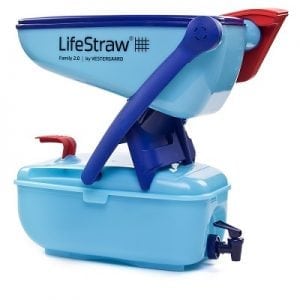
Agriculture
December 29, 2023
LifeStraw Family 2.0
Read SolutionImplemented by
LifeStraw
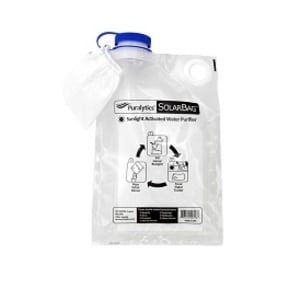
Updated on January 17, 2024
·Created on August 27, 2015
The Solarbag purifies 3.5 L of drinking water via a sunlight-activated, nanotechnology-coated mesh.
SolarBag disinfects chemical contamination in drinking water via a nanotechnology-coated mesh, which is activated by the sun. The SolarBag is compact in size and relatively lightweight making it suitable to ship to areas of humanitarian need.
Target SDGs
SDG 6: Clean Water and Sanitation
SDG 3: Good Health and Well-Being
Market Suggested Retail Price
$99.92
Target Users (Target Impact Group)
Household, NGOs
Distributors / Implementing Organizations
Puralytics Many organizations (Amazon, Brownells, Camping World, Columbia Fire and Safety Ltd., L.L. Bean, REI, Sportsman's Warehouse, Woot, Sportsman's Guide) also offer the SolarBag for purchase.
Countries
Afghanistan, Australia, Azerbaijan, Bangladesh, Belgium, Cameroon, Canada, China, Congo (Kinshasa), Cuba, Denmark, Ecuador, Egypt, El Salvador, Equatorial Guinea, Ethiopia, France, Germany, Ghana, Guatemala, Haiti, India, Indonesia, Iraq, Ireland, Japan, Kazakhstan, Kenya, Korea (South), Kuwait, Malawi, Malaysia, Marshall Islands, Mexico, Netherlands, Nicaragua, Nigeria, Pakistan, Peru, Philippines, Rwanda, Seychelles, Singapore, South Africa, South Sudan, Spain, Sudan, Switzerland, Taiwan, Tanzania, Thailand, Turkey, Uganda, United Arab Emirates, United Kingdom, United States, Vietnam
Manufacturing/Building Method
Mass produced
Intellectural Property Type
Patent
User Provision Model
The SolarBag is available for purchase online. During humanitarian crises, NGOs/nonprofits and governmental agencies can order in bulk from Puralytics. End-user is likely to receive as donations.
Distributions to Date Status
<50,000 (targeted 50,000 by end of 2015) Interview with representative
Description of the combined methods
Nanotechnology disinfection
Manufacturer-specified water treatment rate (L/hr)
3 L, 2-6 hr treatment
Bacteria reduction
6 log
Virus reduction
4 log
Protozoa reduction
3 log
Heavy metals and/or arsenic reduction
Yes, reduction rate unknown
Maximum recommended influent turbidity level (NTU)
Unknown
Effluent turbidity levels (NTU)
<30 NTU
Safe water storage capacity (L)
None
Manufacturer-specified lifetime volume (L)
1500 L
Consumables
None
Design Specifications
Bag dimensions: Total Height: 39.9 cm, Total Width: 24.5 cm, Bag Height: 36.6 cm, Weight: 104 g, Capacity: 3.5 L
The SolarBag is filled with water, and set horizontally in the sun for 2-6 hours depending on both water quality and weather conditions.
Technical Support
FAQ section on Solarbag's website
Replacement Components
Unknown. Since the product handles contaminated water, any defects will most likely compromise the product and require the product to be disposed of.
Lifecycle
The Solarbag has a dry shelf life of 7 years. Puralytics specifies a potential life for the SolarBag as 500 uses.
To dispose of the product cut the bottom of the bag open and remove the mesh insert. Dispose of the mesh insert as non-toxic solid waste, then recycle the plastic bag as Type 7 plastic.
Manufacturer Specified Performance Parameters
Removes the following from water: Bacteria, Viruses, Protozoa, Herbicides, Pesticides, Herbicides, Petrochemicals, Pharmaceuticals, Arsenic, Lead, and Mercury. The self-cleaning mesh does not clog, and the water tastes clean after disinfection. Eliminates 99.9999% of bacteria, 99.99% virus, 99.9% protozoa, removes heavy metals, and destroys man-made chemicals.
Vetted Performance Status
92% of SolarBags functioned normally throughout the first 6 months of trial use. 77% were fully functional even after 6 months.
Safety
SolarBag is unsafe if there is a leak or the activated mesh is compromised. If water is highly turbid or contains sediment, filtering the water or allowing sedimentation to occur will improve the resulting water quality. Saline waters need to be desalinated in conjunction with the use of the SolarBag, as it will not remove salt.
Complementary Technical Systems
For overcast days, the SolarBag comes with Pur-Blue Process Timer, a blue indicator dye that turns clear once the water has been purified. A single drop per bag indicates whether water is ready for drinking.
Academic Research and References
David E. Reisner and T. Pradeep, 2015, Aquananotechnology Global Prospects. CRC Press Taylor & Francis Group.
Naranjo, J.E., Gerba, C.P., 2000, Microbiological water purification without the use of chemical disinfection. Wilderness Environ Med. 11(1), pp. 12-16.
Owen, M.D., Hawkins, T., 2015, Light-activated nanotechnology for drinking water purification. Aquananotechnology: Global Prospects. CRC Press.
Burleson, G.E., 2016, Water treatment technologies for the developing world. Oregon State University: Corvallis, OR.
Byrne, J.A., et. al., 2015, A Review of heterogeneous photocatalysis for water and surface disinfection. Molecules, 20(4), pp. 5574-5615.
“The SolarBag “,Engineeringforchange.org. Available: https://www.engineeringforchange.org/wp-content/uploads/2015/08/SolarBag-NGO-Booklet-1-April-2014.pdf
“SolarBag —,” Puralytics. Available: https://puralytics.com/solarbag
“SolarBag Products,” SolarBag. Available: https://solarbag.com/collections/all
Goal 6. (n.d.). Sdgs.un.org. Available: https://sdgs.un.org/goals/goal6
Engineeringforchange.org. Available: https://www.engineeringforchange.org/wp-content/uploads/2015/08/SolarBag-Technical-Reports-18-Mar-2015.pdf
“FAQ,” SolarBag. Available: https://puralytics.com/faqs-solarbag
“Hunting Articles, Product Reviews, Outdoor Guides,” Sportsman’s News. Available: https://news.sportsmans.com/
Compliance with regulations
Solarbag exceeds highest water quality testing standards from WHO and the EPA; meets National Standards in Turkey, Kenya, Cameroon, Japan, USA, Mexico, Malawi
Evaluation methods
U.S. EPA Standard and Protocol for Evaluation of Microbiological Water Purifiers have been cited by Puralytics. Testing was conducted at the University of Arizona; World Health Organization Protocols
Other Information
Informational video about Solarbag

Agriculture
December 29, 2023
Implemented by
LifeStraw
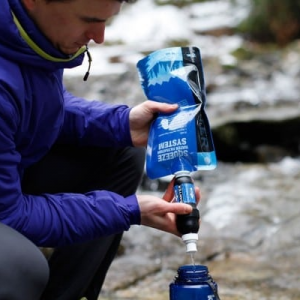
Agriculture
December 29, 2023
Implemented by
Sawyer
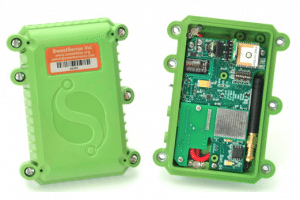
Agriculture
June 26, 2024
Implemented by
SweetSense Inc
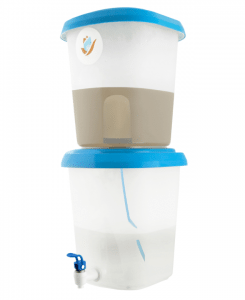
Agriculture
January 4, 2024
Implemented by
Basic Water Needs
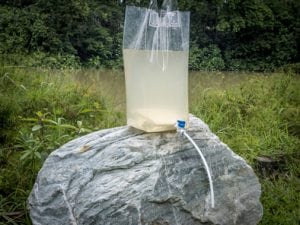
Agriculture
January 2, 2024
Implemented by
wateroam
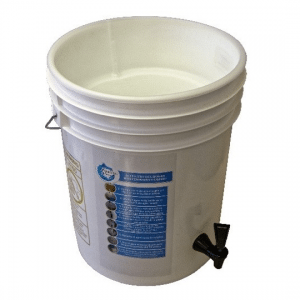
Agriculture
December 27, 2023
Implemented by
Aqua Clara International

Agriculture
January 10, 2024
Implemented by
Dr. David Manz, University of Calgary
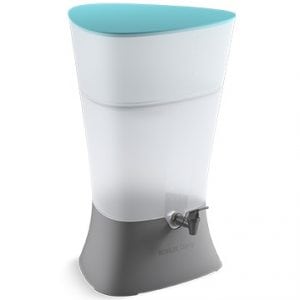
Agriculture
January 11, 2024
Implemented by
Kohler
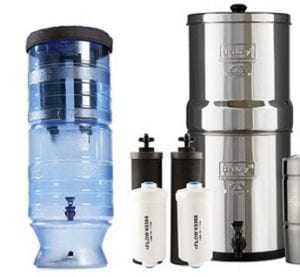
Agriculture
January 11, 2024
Implemented by
New Millennium Concepts, Ltd
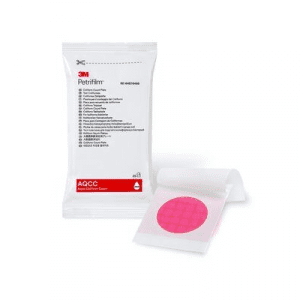
Agriculture
January 24, 2024
Implemented by
3M
Have thoughts on how we can improve?
Give Us Feedback